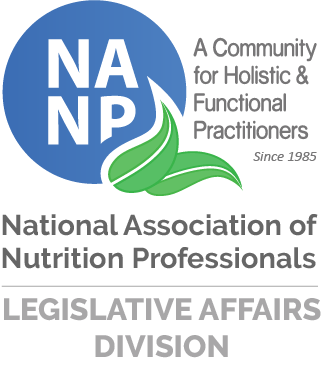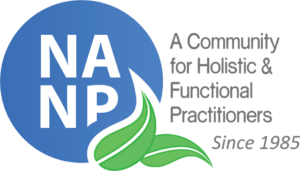NANP Legislative Affairs Division
For many just starting down the path of a career in Holistic Nutrition there are many questions to be asked and answered. Let us help demystify one of the most asked questions we get…
Do I need a license to practice holistic nutrition?
VIDEO: Let’s Talk About Licensure with NANP team members Andrea Grandson, NT, BCHN®, Nicole Hodson, NC, BCHN®, CDSP™, & Laura Waldo, NTP, BCHN®
Which states require a license for nutrition counseling?
Holistic Nutrition Professionals (HNPs) are not licensed in any state.
Scope of Practice:
- HNPs do not diagnose, treat, cure, prevent, prescribe, heal, or manage any disease state in our clients.
- HNPs do not practice Medical Nutrition Therapy (MNT) which is the provision of nutrition care services for the treatment or management of a disease or medical condition. Please note that the definition of MNT may differ from state to state. The NANP recommends that practitioners review the laws of their state to remain within their Scope of Practice.
- HNPs may be able to order laboratory assessments. Please check the laws in your state.

Exclusive Scope of Practice States
Title Protection States
No Law or Certification States
Exclusive Scope of Practice States
Exclusive Scope of Practice States are the most difficult and restrictive for holistic nutrition professionals to practice. These states require a license to provide nutrition care services, and only Dietitians and, in some cases, Certified Nutrition Specialists (nutritionists) may obtain a license. These states typically have exemption language written in their laws allowing holistic nutrition professionals to provide general nutrition information; however, you may not individualize dietary recommendations or assess the nutrient status of your client. General nutrition information applies to the masses and can be found in a book, a medical journal, on the internet, etc. These states also protect titles such as dietitian, nutritionist, dietitian/nutritionist, and abbreviations such as L.D., L.N., R.D.N., and C.N.S. Practitioners should be aware that there may be legal penalties if found guilty of practicing outside of the scope of practice which includes monetary fines and jail time.
Title Protection States
Holistic nutrition professionals may work with individuals and groups providing nutrition services; however, as the name implies, you may not refer to yourself as nor imply that you are a dietitian, and in many states, the title nutritionist is protected. You may not state nor imply that you are licensed or certified by the State. Each state has laws governing protected titles and abbreviations/designations, and the NANP urges holistic nutrition professionals to review the laws of their state.
No Law or Certification States
These states are the most lenient regarding how a holistic nutrition professional may practice. States such as California, Washington State, Colorado, Arizona, Maine, etc., do not have regulatory restrictions on who may provide nutrition advice. Some of these states do protect specific titles and abbreviations/designations. The NANP recommends that practitioners check their state’s laws as new regulations that affect who and how holistic nutrition professionals provide services can be added.
Working with International Clients
The information provided by the National Association of Nutrition Professionals (NANP) is intended for educational purposes only and is based on guidelines applicable to the United States. Our resources and recommendations are tailored explicitly to U.S. laws and may not be applicable or compliant with regulations in other countries. Members are encouraged to seek local expertise from nutrition associations in other countries before working with clients overseas and adhere to the guidelines relevant to their specific location when working internationally. NANP Legislative Affairs is unable to offer guidance to members regarding working outside of the United States, as nutritional regulations vary significantly by country and region.
A Note About General Nutrition Information
Each State (including those with Exclusive Scope of Practice Laws) has exemptions regarding “General Nutrition Information.” While general nutrition information is not clearly defined, the clause typically appears in the Exemptions or Exceptions section of the law. An example: Nothing in this law prevents “Any person who does not represent himself as a licensed dietitian or licensed nutritionist from furnishing information on food, food materials, or dietary supplements or from engaging in the explanation to customers about food, food materials, or dietary supplements.”
When state laws limit the ability to “individualize” our recommendations, working up to the level of our education, we may still provide clients with general health and wellness information. Examples include providing guidance, advice, and education that applies to the masses/general public, which is found in a book, medical journal, website, podcast, etc. While the laws prevent “individualizing” nutrition services (such as meal plans), you may provide information to a client about food selection, food preparation, “normal nutritional requirements,” and sources of nutrients in foods. You may provide clients with your favorite recipes/favorite cookbooks/favorite blogs/favorite farmer, or even a favorite meal delivery service. You may make recommendations for dietary supplements or herbs and advise your clients about using those products. These states will most often allow Holistic Nutrition Professionals (HNPs) to work with individuals or groups, but always check the laws of your state. They also may allow HNPs to work in health food stores and give talks/speeches in the community, but be sure always to state that you are not a dietitian or nutritionist and that you are not licensed or certified by the State).
STAY ON TOP OF LEGAL & LEGISLATIVE ISSUES… your livelihood might depend on it!
NANP is the leading U.S. trade association that sets the nation’s standards for schools that abide by the highest-quality academic, ethical, and scope of practice standards to which the holistic nutrition professional should adhere. Just as Registered Dietitians (RDs) (who have graduated from accredited universities with specific academic standards) are members of the Academy of Nutrition and Dietetics (AND) and are entitled to the various AND benefits, graduates from NANP-approved holistic nutrition programs are encouraged to join the NANP for similar reasons. Professional membership in the NANP demonstrates that an individual has graduated from a quality holistic nutrition program that has been vetted and recognized by standards established by an objective 3rd party who sets such standards without “influence” by any one school or program.
Since the NANP is comprised of only holistic nutrition students and professionals, it’s literally our business to understand you and your unique education, qualifications, and needs.
The truth is that many students and recent graduates don’t often realize that the laws surrounding their work vary from state to state, and ongoing legislative efforts are afoot throughout the U.S. to limit their right to practice.
BUT, TOGETHER WE CAN MAKE A DIFFERENCE
Our Legislative Affairs Division is here to fight for YOU! The NANP will attend hearings and represent members in their local areas. Our Legislative Affairs Specialist, Laura Waldo can even help train you to become an industry activist, so lawmakers can hear your voice!
Your success is crucial to the NANP’s vision of a future where people choose food as their medicine. The NANP whole-heartedly supports your goal of helping to heal the world through a nutrient-dense, whole foods approach to eating.
In today’s ever-changing landscape of legal rights to practice in each state, you will have peace of mind with full access to the NANP Legislative Affairs Division. Become a Professional NANP member today!
Graduates of NANP-approved schools who choose not to become NANP members should consult with their personal attorney for specific questions relating to their right to practice in their state. Since non-members have not gone through our member vetting process (and haven’t agreed to our ethics, scope of practice policies, among other qualifications); without this kind of validation, providing consultation to these individuals would put our credibility and standards at risk.
Already a member? Click here to log into your NANP Member Account, then go to Legislative & Legal News.
Legal Disclaimer: Information contained on this website is not offered as legal advice and should not be used as a substitute for seeking professional legal advice.
What Members Are Saying
"Not only does NANP support us as Nutrition Professionals as a whole, but the community and resources that we can use in our day to day business are all there for us in one place."
~ NANP member
